-
 The Use of Educational Process Mining on Dropout and Graduation Data in the Curricula (Re-)Design of Universities
The Use of Educational Process Mining on Dropout and Graduation Data in the Curricula (Re-)Design of Universities -
 Exploring Engineering Students’ Perceptions of Diversity and Inclusion in a Southern Public University: A Case Study
Exploring Engineering Students’ Perceptions of Diversity and Inclusion in a Southern Public University: A Case Study -
 Access to University Studies: A New Form of Discrimination for Low-Functioning People
Access to University Studies: A New Form of Discrimination for Low-Functioning People
Journal Description
Trends in Higher Education
Trends in Higher Education
is an international, peer-reviewed, open access journal on higher education published quarterly online by MDPI.
- Open Access— free for readers, with article processing charges (APC) paid by authors or their institutions.
- Rapid Publication: manuscripts are peer-reviewed and a first decision is provided to authors approximately 18.9 days after submission; acceptance to publication is undertaken in 5.1 days (median values for papers published in this journal in the second half of 2023).
- Recognition of Reviewers: APC discount vouchers, optional signed peer review, and reviewer names published annually in the journal.
Latest Articles
Implementation of Learning Management Systems (Moodle): Effects on Students’ Language Acquisition and Attitudes towards Learning English as a Foreign Language
Trends High. Educ. 2024, 3(2), 260-272; https://doi.org/10.3390/higheredu3020016 - 18 Apr 2024
Abstract
Among the most popular learning management systems (LMS) available worldwide is Moodle. This current study examines how learners’ attitudes toward English as a foreign language (EFL) and their language proficiency are affected by Moodle’s interactive language-learning activities. Thirty-three undergraduate students participated in this
[...] Read more.
Among the most popular learning management systems (LMS) available worldwide is Moodle. This current study examines how learners’ attitudes toward English as a foreign language (EFL) and their language proficiency are affected by Moodle’s interactive language-learning activities. Thirty-three undergraduate students participated in this study. We investigated the effects of engaging language-learning exercises that were practiced on Moodle using an experimental research design. To find out if the experimental and control groups differed significantly from one another on pre- and post-measures regarding the development of language skills and attitudes toward language classrooms, a number of statistical tests were employed. We conducted a data analysis using SPSS software. The results demonstrated that there were differences favoring the experimental group in the development of language skills and the attitudes of learners toward the language classroom. There were no apparent differences in forming structures, speaking, or listening compared to the control group’s learners. On the other hand, there were notable differences in the overall score, writing and reading skills, and lexical item mastery. Additionally, significant differences in the language acquisition growth of the experimental and control groups were found using an independent-sample t-test in the post-test, with the experimental group benefiting.
Full article
Open AccessArticle
Adaptive Complexity: Examining Texas Public Postsecondary Institutions’ Provision of Student Basic Needs Programs
by
Lisa K. Zottarelli, Xiaohe Xu, Jayla M. Hatcher, Raji Thiruppathiraj, Natasha Ellis, Shamatanni Chowdhury and Thankam Sunil
Trends High. Educ. 2024, 3(2), 247-259; https://doi.org/10.3390/higheredu3020015 - 16 Apr 2024
Abstract
This study reveals that the likelihood and diversity of postsecondary institutions providing basic needs programs are significantly influenced by institutional factors such as the institutions’ organization and size. This study also indicates that Hispanic-Serving Institutions tend to provide emergency housing, which highlights a
[...] Read more.
This study reveals that the likelihood and diversity of postsecondary institutions providing basic needs programs are significantly influenced by institutional factors such as the institutions’ organization and size. This study also indicates that Hispanic-Serving Institutions tend to provide emergency housing, which highlights a targeted response to specific community needs. In addition, the analysis indicates that the presence of students with financial needs is linked to the availability of food pantry services, suggesting a strategic approach to address student welfare. The findings from this study provide critical insights into how institutional characteristics influence the provision and variety of basic needs services. These conclusions not only underscore the pivotal role of such services in supporting the overall well-being and academic success of students but also indicate institutional factors that support the formal implementation of a variety of basic needs programs to meet diverse student needs.
Full article
Open AccessArticle
The Use of Gamification for Learning SCRUM: Findings from a Case Study with Information Systems Students
by
Filomena Castro Lopes and Sandra Fernandes
Trends High. Educ. 2024, 3(2), 235-246; https://doi.org/10.3390/higheredu3020014 - 16 Apr 2024
Abstract
►▼
Show Figures
Gamification has emerged in higher education as an innovative approach that engages and stimulates student participation and active learning, through the integration of game elements in the learning experience. This study presents a case study in the field of Information Systems, based on
[...] Read more.
Gamification has emerged in higher education as an innovative approach that engages and stimulates student participation and active learning, through the integration of game elements in the learning experience. This study presents a case study in the field of Information Systems, based on the use of gamification, through the use of Lego bricks, to learn SCRUM. The participants in the study include 12 first-year students, enrolled in the curricular unit of Information Systems, in the academic year of 2022/2023, at a Portuguese Higher Education Institution. The objective of the study is to analyze student’s understanding of the SCRUM approach, in regard to: (1) how students understand the different roles of SCRUM and the objective of each ceremony; and (2) how students understand the structure of the SCRUM framework. Findings from the study show that students who engaged in the gamified learning environment demonstrated higher comprehension of SCRUM roles, scoring significantly better on assessments compared to their non-participating peers. In general, students felt that the gamification experience achieved its objectives. Future work aims to bring the game closer to the reality of the software development process, making it more aligned with the lego4scrum methodology approach.
Full article
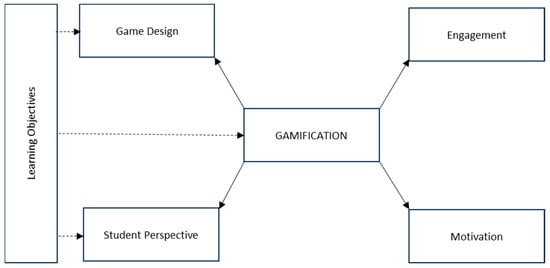
Figure 1
Open AccessArticle
On the Quality and Validity of Course Evaluation Questionnaires Used in Tertiary Education in Greece
by
Ilias Papadogiannis, Costas Vassilakis, Manolis Wallace and Athanassios Katsis
Trends High. Educ. 2024, 3(2), 221-234; https://doi.org/10.3390/higheredu3020013 - 12 Apr 2024
Abstract
►▼
Show Figures
In compliance with national legislation, Greek tertiary education institutions assess educational quality often using a standardized anonymous questionnaire completed by students. This questionnaire aims to independently evaluate various course components, including content organization, instructor quality, facilities, infrastructure, and grading methods. Despite widespread use
[...] Read more.
In compliance with national legislation, Greek tertiary education institutions assess educational quality often using a standardized anonymous questionnaire completed by students. This questionnaire aims to independently evaluate various course components, including content organization, instructor quality, facilities, infrastructure, and grading methods. Despite widespread use across universities, the questionnaire’s validity remains unexamined. This study addresses this gap by analyzing 48,000+ questionnaire responses from the University of the Peloponnese (2014–2022), encompassing 68 undergraduate and graduate programs. Confirmatory factor analyses were used to assess the quality of the questionnaire, while exploratory factor analyses were used to assess the dimensions of the tool based on the data. Both analyses reveal shortcomings: confirmatory analysis detects strong correlations between supposedly different factors, and exploratory analysis identifies dimensions inconsistent with the expected structure. These findings question the questionnaire’s quality and the validity of drawn conclusions, while additionally identifying opportunities for reducing the number of questions, which can contribute to increased questionnaire submission rates. Given its common use across Greek universities and its influence on shaping courses, urgent redesigning of the questionnaire for tertiary education evaluation is recommended.
Full article
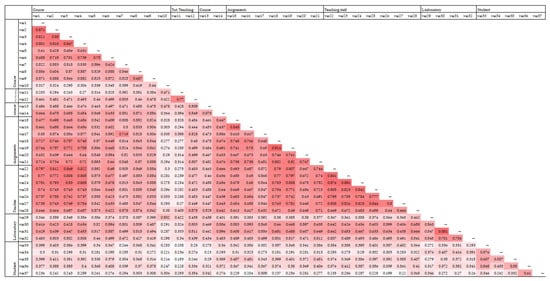
Figure 1
Open AccessSystematic Review
Rise of Wisdom Pedagogy Research in Higher Education (1980–2022): A Systematic Literature Review
by
Maria Jakubik
Trends High. Educ. 2024, 3(2), 199-220; https://doi.org/10.3390/higheredu3020012 - 28 Mar 2024
Abstract
►▼
Show Figures
This paper explores: How has wisdom pedagogy research emerged in higher education during 1980–2022? This study is the first to explore the emergence of wisdom pedagogy research in higher education applying Bipartite network analysis for detecting clusters of 24 wisdom pedagogy articles of
[...] Read more.
This paper explores: How has wisdom pedagogy research emerged in higher education during 1980–2022? This study is the first to explore the emergence of wisdom pedagogy research in higher education applying Bipartite network analysis for detecting clusters of 24 wisdom pedagogy articles of 53 authors and 161 keywords. Results are visualized with WoS analytics, word-clouds, and with Bipartite network. Wisdom research in higher education is two decades late compared with other disciplines. In higher education n = 524 wisdom, n = 33 wisdom pedagogy publications were detected in the Web of Science Core Collection database. This paper analyzed n = 24 wisdom pedagogy articles published during the 1980–2022 period. There were only two articles found dealing directly with wisdom pedagogy. Therefore, this study has several further research implications for educational researchers. Firstly, they need to conduct a more comprehensive search for wisdom pedagogy models by extending the scope of this study to other databases, books, book chapters, and to conference papers. Secondly, they need to synthesize and theorize their findings by building a wisdom pedagogy model. Thirdly, researchers need to develop detailed guidelines for educational practitioners on how to apply wisdom pedagogy in practice. This study is only at the beginning of this journey. However, it would be important for educating students with wisdom pedagogy in higher education because it would facilitate students’ thinking, judgements, and actions based on their moral and ethical values in a highly interconnected and complex world.
Full article
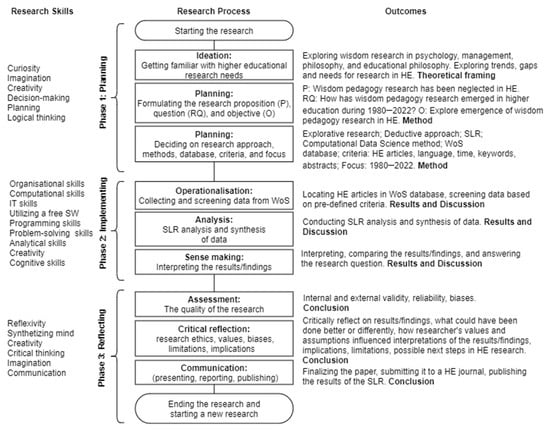
Figure 1
Open AccessArticle
What High-Impact Practices Work for Minoritized Students? Institutional Inequities in College Learning Opportunities and Outcomes
by
Jaekyung Lee, Namsook Kim, Mengchen Su and Samantha Greenwood
Trends High. Educ. 2024, 3(2), 180-198; https://doi.org/10.3390/higheredu3020011 - 25 Mar 2024
Abstract
►▼
Show Figures
This mixed-methods study examines what high-impact practices (HIPs) help improve the chances of college and career success among minoritized students. Building on transformative and ecological perspectives of HIPs, the study tracks U.S. 4-year college students’ learning opportunities towards bachelor’s degree completion followed by
[...] Read more.
This mixed-methods study examines what high-impact practices (HIPs) help improve the chances of college and career success among minoritized students. Building on transformative and ecological perspectives of HIPs, the study tracks U.S. 4-year college students’ learning opportunities towards bachelor’s degree completion followed by job employment or graduate/professional school enrollment. It explores a more comprehensive and diverse set of HIPs: academic and sociocultural engagement, study abroad, foreign language, co-op/internship, student teaching, advanced math and writing courses, research, and volunteer activities. Statistical analyses of the Beginning Postsecondary Students (BPS) data reveal racial and socioeconomic inequities in HIP participation among different types of institutions, with relatively favorable opportunities and outcomes in private or research (doctorate-granting) universities. The qualitative analyses of college student interviews offer insights into the questions of why and how HIPs work (or not) for minoritized students. The study gives evidence-based policy guidelines for improving minoritized students’ college and career success by tackling institutional inequities in high-impact practices and learning opportunities.
Full article
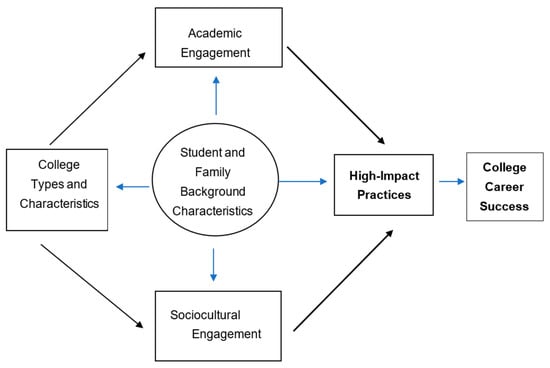
Figure 1
Open AccessArticle
Mentoring and Networking as the “Silver Lining” of Being Women Leaders: An Exploratory Study in Top World Forestry Schools
by
Pipiet Larasatie, Taylor Barnett and Eric Hansen
Trends High. Educ. 2024, 3(1), 169-179; https://doi.org/10.3390/higheredu3010010 - 06 Mar 2024
Abstract
Although there are multiple efforts to increase gender equality in the forest sector, women are still underrepresented in the forest sector workforce, even more so in top leadership of forest sector companies. This underrepresentation is also found in higher education, and many forestry
[...] Read more.
Although there are multiple efforts to increase gender equality in the forest sector, women are still underrepresented in the forest sector workforce, even more so in top leadership of forest sector companies. This underrepresentation is also found in higher education, and many forestry undergraduate programs still struggle to matriculate and graduate women. A way to attract and retain women is through mentoring and networking. Utilizing interviews, we found that it is quite challenging to find a woman mentor/role model in the forest sector because women are still underrepresented. To find a good mentor, young women are encouraged to be proactive in utilizing different channels, both formal and informal. When it comes to gender, our respondents emphasize the different benefits of having a woman vs. man as a mentor. In a men-dominated field such as the forest sector, women mentors enhance social belonging, confidence, and motivation in relatively alienating environments due to “been there-done that” experiences. Same-gender role models might also protect women from negative stereotypes and show how women can advance despite existing gendered barriers.
Full article
Open AccessArticle
Developing Effective Educational Chatbots with GPT: Insights from a Pilot Study in a University Subject
by
Sánchez-Vera Fulgencio
Trends High. Educ. 2024, 3(1), 155-168; https://doi.org/10.3390/higheredu3010009 - 04 Mar 2024
Abstract
►▼
Show Figures
This study presents research on the development process of GPT-based educational chatbots. A case study methodology was employed to address the process of designing, implementing, and evaluating a prototype that functioned as a personal tutor for the Sociology of Education course in the
[...] Read more.
This study presents research on the development process of GPT-based educational chatbots. A case study methodology was employed to address the process of designing, implementing, and evaluating a prototype that functioned as a personal tutor for the Sociology of Education course in the Primary Education Teaching Degree. The objective is to provide valuable insights into the processes, challenges, and outcomes of this technology and to determine its potential and limitations as an educational personal tutor. The chatbot underwent laboratory tests, which included real exams from previous courses and other specific assessments. After an iterative refinement process, a final product with optimal results was achieved. This study offers a robust model for the development of GPTs, as well as an analysis of the current possibilities and limitations of this technology for education. The study concludes by emphasizing the importance of continuous innovation and research in the use of emerging technologies like chatbots in education, highlighting their potential to transform traditional teaching methods.
Full article
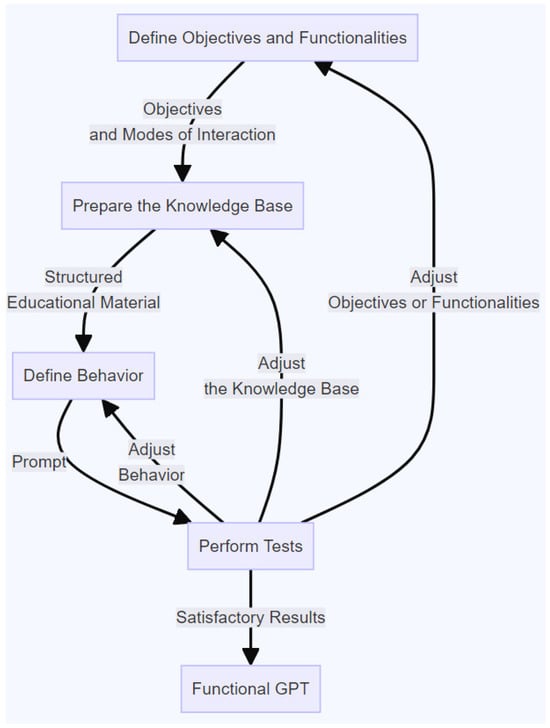
Figure 1
Open AccessArticle
In Search of a More Balanced Engineering Curriculum: The Perspective of Students, Teachers, Alumni and Employers
by
Carla Ferreira, Bárbara Gabriel, Robertt Valente, António Andrade-Campos, João Dias-de-Oliveira, Victor Neto, Sandra Soares, Teresa Carvalho and Cláudia Figueiredo
Trends High. Educ. 2024, 3(1), 142-154; https://doi.org/10.3390/higheredu3010008 - 22 Feb 2024
Abstract
The purpose of this paper is to raise important issues in engineering education in the face of contemporary challenges and demands through the voices of different stakeholders in engineering curricula and in the practice of professional engineering. Several challenges and future perspectives are
[...] Read more.
The purpose of this paper is to raise important issues in engineering education in the face of contemporary challenges and demands through the voices of different stakeholders in engineering curricula and in the practice of professional engineering. Several challenges and future perspectives are based on important skills, like soft skills, which are required by employers and include communication, decision-making, problem-solving, leadership and emotional intelligence, as well as the ability to work with people of different backgrounds and apply technical knowledge. A qualitative data analysis of interviews with students, alumni, teachers and employers revealed the demand for more balanced qualified curricula for higher education institutions in the field of engineering. This includes the promotion of collaborative learning spaces, authentic learning experiences based on engaging students in real situations, project-based learning, industrial visits, guest lectures and problem-solving methodologies that are perceived by these stakeholders as essential in the construction of a curriculum, in line with the specific technical competences of each area.
Full article
(This article belongs to the Special Issue Higher Education: Knowledge, Curriculum and Student Understanding)
►▼
Show Figures
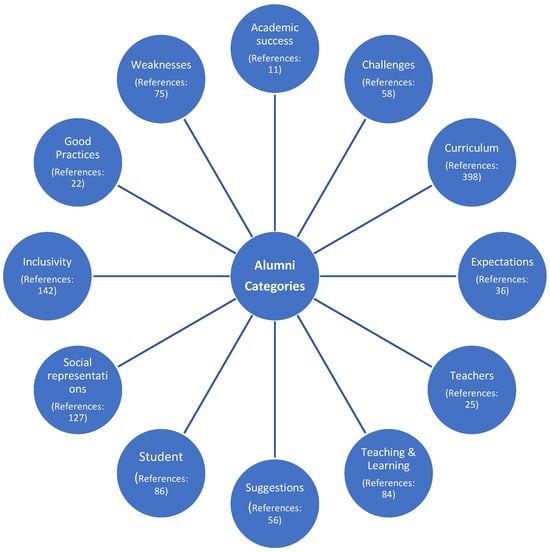
Figure 1
Open AccessReview
The Impact of Three Key Paradigm Shifts on Disability, Inclusion, and Autism in Higher Education in England: An Integrative Review
by
Eunice S. Y. Tang, Austin Griffiths and Graham F. Welch
Trends High. Educ. 2024, 3(1), 122-141; https://doi.org/10.3390/higheredu3010007 - 01 Feb 2024
Abstract
►▼
Show Figures
In the past two decades, students have been more willing to disclose their disability status when entering higher education (HE) in the United Kingdom (UK). Concurrently, higher education institutions (HEIs) have adopted disability policies and service teams for enhancing equality, diversity, and inclusion
[...] Read more.
In the past two decades, students have been more willing to disclose their disability status when entering higher education (HE) in the United Kingdom (UK). Concurrently, higher education institutions (HEIs) have adopted disability policies and service teams for enhancing equality, diversity, and inclusion in the UK. The purpose of this integrative review is to understand the basis of these trends. The article suggests that there have been three major key paradigm shifts that underpin this cultural change. (1) There was a paradigm shift in terms of changing the dominant models for conceptualising disability from a medical model of disability to a social model of disability and to an affirmative model of disability, together with a debate and policy development demonstrating a concern for greater social inclusion and exclusion; (2) with a massive increase in students entering HE and the rising importance of league tables and ranking systems, universities experienced a paradigm shift from teacher-centred learning (TCL) to inclusive student-centred learning and teaching (SCLT); and (3) the increase in autism disclosure in HE signifies a shift in a conceptualisation of autism from a disorder to a disability and an example of neurodiversity.
Full article
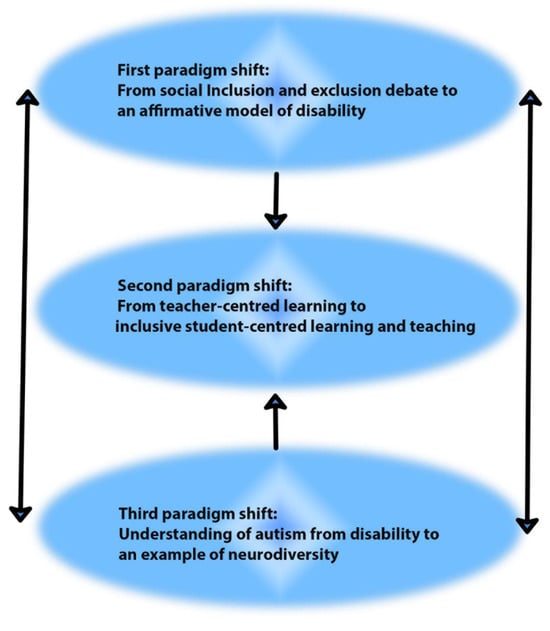
Figure 1
Open AccessArticle
High-Impact Teaching Practices in Higher Education: Understanding Barriers, Concerns, and Obstacles to Their Adoption
by
Kristin VanWyngaarden, Julie A. Pelton, Pamela Martínez Oquendo and Christopher Moore
Trends High. Educ. 2024, 3(1), 105-121; https://doi.org/10.3390/higheredu3010006 - 25 Jan 2024
Abstract
This research explores the barriers, concerns, and obstacles undergraduate STEM educators face when implementing high-impact teaching practices (HIPs), the application of which may improve student learning outcomes. Because our study took place during the COVID-19 pandemic, our results also shed light on the
[...] Read more.
This research explores the barriers, concerns, and obstacles undergraduate STEM educators face when implementing high-impact teaching practices (HIPs), the application of which may improve student learning outcomes. Because our study took place during the COVID-19 pandemic, our results also shed light on the unique challenges of utilizing HIPs in asynchronous online-learning environments. Thirteen undergraduate instructors were interviewed about their current teaching practices in order to identify barriers to or support for adopting HIPs. Data collected through semi-structured interviews revealed administrative and financial restraints as barriers to effective teaching which have been found in previous research. A number of new and unique obstacles emerged out of teaching remotely or online during the pandemic, including a heightened concern over the instructor’s ability to connect with students and engage in the best teaching practices. This research extends our current understanding of barriers and concerns about adopting HIPs in undergraduate STEM courses because of the unique perceived threats that emerged during the pandemic. We identify strategies to equip faculty with the support they need to provide equitable learning experiences, including access to consultants who support curriculum development and implementation in the classroom, ongoing educational coaching, and increased access to professional-development opportunities and a community of inquiry to discuss teaching strategies.
Full article
Open AccessArticle
Exploring Engineering Students’ Perceptions of Diversity and Inclusion in a Southern Public University: A Case Study
by
Shenghua Wu, Andrew Burleson, Samantha Islam, Drew Gossen and Abeeb Oyelere
Trends High. Educ. 2024, 3(1), 67-104; https://doi.org/10.3390/higheredu3010005 - 23 Jan 2024
Abstract
►▼
Show Figures
Understanding the present landscape of students’ perceptions and the representation of diversity and inclusion within engineering textbooks is paramount for the effective development and execution of diversity and inclusion initiatives. This case study, conducted in the College of Engineering at the University of
[...] Read more.
Understanding the present landscape of students’ perceptions and the representation of diversity and inclusion within engineering textbooks is paramount for the effective development and execution of diversity and inclusion initiatives. This case study, conducted in the College of Engineering at the University of South Alabama, aims to assess the current perceptions of diversity among its engineering students. The study encompasses three fundamental elements: textbook evaluations, comprehensive student surveys comprising 30 questions that explore various facets of the engineering curriculum, student organizations, and the workforce, along with in-person interviews. The summarized findings provide invaluable insights for faculty, instructors, and administrators, facilitating informed decision making and program enhancement in the realm of diversity and inclusion.
Full article

Figure 1
Open AccessArticle
The Use of Educational Process Mining on Dropout and Graduation Data in the Curricula (Re-)Design of Universities
by
Alexander Karl Ferdinand Loder
Trends High. Educ. 2024, 3(1), 50-66; https://doi.org/10.3390/higheredu3010004 - 17 Jan 2024
Abstract
High college dropout rates are not a desired outcome for university management. Efforts have been made to increase student retention via understanding dropouts and building support mechanisms. With the emergence of Big Data, educational process mining came into existence, allowing for new methods
[...] Read more.
High college dropout rates are not a desired outcome for university management. Efforts have been made to increase student retention via understanding dropouts and building support mechanisms. With the emergence of Big Data, educational process mining came into existence, allowing for new methods of structuring and visualizing data. Previous studies have established an approach to generate process maps from the course sequences students take. This study improves this method by focusing on visualizing students’ pathways through a study program dependent on their status as a “dropout” or “graduate” and on the level of every degree program. An interactive framework in a web application dedicated to curriculum designers was created. The data of 53,839 students in 78,495 studies at the University of Graz (Austria) between 2012/13 and 2022/23 were used for process mining. The generated process maps provide information on the exam sequence of students. They have been implemented in discussion forums with stakeholder groups and are part of the curriculum (re)design processes. The maps provide the benefit of being able to compare and monitor successful and non-successful students’ maps using real-time data. Despite their use for curriculum development, they are limited in their size and the number of exams that can be displayed, making them a good fit for early dropout evaluation.
Full article
(This article belongs to the Special Issue Higher Education: Knowledge, Curriculum and Student Understanding)
►▼
Show Figures
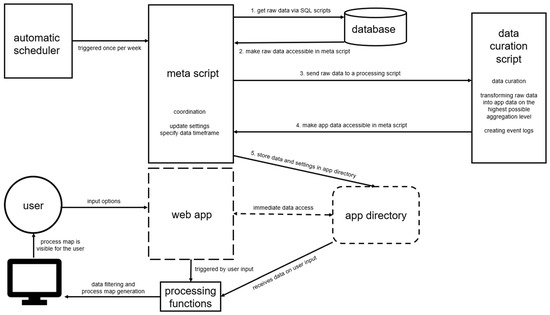
Figure 1
Open AccessArticle
Examining Anti-Poverty Programs to Address Student’s Unmet Basic Needs at Texas Hispanic-Serving Institutions over the Course of the COVID-19 Pandemic
by
Lisa K. Zottarelli, Thankam Sunil, Xiaohe Xu and Shamatanni Chowdhury
Trends High. Educ. 2024, 3(1), 34-49; https://doi.org/10.3390/higheredu3010003 - 03 Jan 2024
Abstract
Many post-secondary institutions have implemented anti-poverty programs to address students’ basic needs insecurities. This study examined the provision of 17 types of basic needs programs at Texas Hispanic-serving institutions over the course of the COVID-19 pandemic with the aim to identify changes in
[...] Read more.
Many post-secondary institutions have implemented anti-poverty programs to address students’ basic needs insecurities. This study examined the provision of 17 types of basic needs programs at Texas Hispanic-serving institutions over the course of the COVID-19 pandemic with the aim to identify changes in the number and types of programs offered as well as factors that may influence the presence of specific types of basic needs programs on campus. While the average number of basic needs programs per institution varied little over time, the specific types of programs that were offered changed. Institution type as a 2-year or 4-year institution was associated with providing on-campus mental health services, on-campus physical health services, and after-school care for students’ children at pre-pandemic and anticipated post-pandemic time points and employing students and free food or meal vouchers at the pre-pandemic time point. The percentage of students receiving Pell Grants was associated with basic needs programs to assist students applying for public services and referrals to off-campus health services pre-pandemic and anticipated post-pandemic. The presence of an on-campus free food pantry was associated with the percentage of students receiving Pell Grants at the anticipated post-pandemic time point only. Over the course of the pandemic, there were changes to the types of basic needs programs offered. Some types of basic needs programs were associated with institutional and/or student characteristics. Given the continued presence of basic needs programs through the course of the pandemic and into the post-pandemic period, the use of these kinds of programs and services to support students, while influenced by external factors such as the pandemic, appears institutionally established as a way to facilitate going to college for students in need.
Full article
Open AccessReview
Project-Based Learning as a Potential Decolonised Assessment Method in STEM Higher Education
by
Joanne Daniella Lalujan and Md Zahidul Islam Pranjol
Trends High. Educ. 2024, 3(1), 16-33; https://doi.org/10.3390/higheredu3010002 - 03 Jan 2024
Cited by 1
Abstract
Decolonising the curriculum (DtC) is an emerging concept that continues to challenge higher education institutions globally, with educators and scholars increasingly recognising how traditional curricular structures, content, and pedagogical practices can reinforce colonial biases and marginalise certain student groups. DtC can be seen
[...] Read more.
Decolonising the curriculum (DtC) is an emerging concept that continues to challenge higher education institutions globally, with educators and scholars increasingly recognising how traditional curricular structures, content, and pedagogical practices can reinforce colonial biases and marginalise certain student groups. DtC can be seen as a process rather than a phenomenon, one which is ongoing and multiplexed, consisting of elements that aim to dismantle the hierarchy between staff and students and question the ways in which knowledge is produced, valued, and disseminated. The expected outcome is to provide students with an education which is equitable, inclusive, and relevant to their personal lives and experiences. Efforts in DtC have continued to gain traction, but assessment practices remain overlooked as a crucial component, with most decolonising efforts focussed towards content and pedagogy. As such, this review aims to contribute to the conversation by exploring the roots and impacts of colonisation on higher education, particularly within the context of assessment in STEM subjects. We examine various elements of decolonised assessment methods and ultimately suggest project-based learning (PBL) as a comprehensive approach that brings together the aforementioned decolonial elements, illustrating this concept through the examination of a PBL assessment mode study conducted at the University of Sussex.
Full article
(This article belongs to the Special Issue STEM in Higher Education)
Open AccessArticle
Access to University Studies: A New Form of Discrimination for Low-Functioning People
by
Tamara Rodríguez-Rodríguez, José-María Álvarez-Martínez-Iglesias, Jesús Molina-Saorín and José-Antonio Marín-Marín
Trends High. Educ. 2024, 3(1), 1-15; https://doi.org/10.3390/higheredu3010001 - 20 Dec 2023
Abstract
►▼
Show Figures
Although it would seem that we are currently in a more inclusive society, the reality is quite different, since discriminatory models continue to be perpetuated based on the level of functional performance of each person. In this sense, the purpose of this study
[...] Read more.
Although it would seem that we are currently in a more inclusive society, the reality is quite different, since discriminatory models continue to be perpetuated based on the level of functional performance of each person. In this sense, the purpose of this study is to find out the degree of discrimination that people with low functional performance have in relation to the rest of the population on the basis of sex and level of studies. To this end, through a thorough investigation based on the scientific method and articulated via statistical analysis (the modelling of categorical data), this study reveals the situations of inequality to which people with low functional performance are subjected in terms of higher education. This study used the survey on Employment of People with Disabilities (EPD), carried out by the National Statistics Institute (INE), and conducted annually with a sample size of 60,000 households, equivalent to some 200,000 people. The statistical analysis was carried out using R software and the main techniques used were contingency table modelling, log-linear models, and logistic models. Finally, some recommendations are offered to contribute to social awareness, for which the role of teachers is a crucial element for educational equity and their training is of vital importance, as teachers are a key element in adapting contents to different abilities, especially for people with lower functional performance. The quality of the initial training they receive will depend on their achievement.
Full article

Figure 1
Open AccessArticle
Investigating Graduate Students’ Experiences through Structural Equation Modeling (SEM)
by
Karen M. Collier and Margaret R. Blanchard
Trends High. Educ. 2023, 2(4), 718-746; https://doi.org/10.3390/higheredu2040042 - 12 Dec 2023
Abstract
►▼
Show Figures
This study used structural equation modeling (SEM) to investigate the role of graduate students’ experiences of microaffirmations, microaggressions, financial concerns, and mentor support (exogenous variables) on their perceptions of imposter syndrome, sense of belonging, and access and opportunities (endogenous variables). These success factors
[...] Read more.
This study used structural equation modeling (SEM) to investigate the role of graduate students’ experiences of microaffirmations, microaggressions, financial concerns, and mentor support (exogenous variables) on their perceptions of imposter syndrome, sense of belonging, and access and opportunities (endogenous variables). These success factors were measured using the Graduate Student Support Survey (GSSS), a 7-factor, 28-item survey. The GSSS success factors were mapped onto the basic needs components of self-determination theory: relatedness, competence, and autonomy. The SEM investigated the experiences of students based on a wide range of personal factors: enrollment status (full/part-time), gender, major (STEM/non-STEM), demographic group (race/ethnicity), degree type (M.S./Ph.D.), and family college experience (first/continuing generation). The SEM identified several significant pathways between the latent constructs (e.g., mentor support and sense of belonging) and differences based on demographic characteristics (e.g., STEM, female, and part-time student). Recognizing the impact of these factors on students’ well-being can spur relevant university administrators, faculty, and staff to take steps that will create a more inclusive campus climate that better supports graduate student success.
Full article
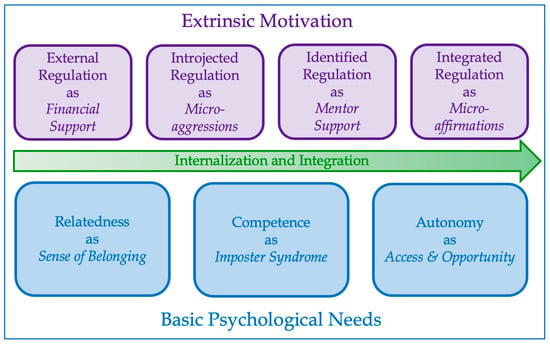
Figure 1
Open AccessSystematic Review
Assessing University Students’ Beliefs and Attitudes towards Sustainability and Sustainable Development: A Systematic Review
by
Eleonora Concina and Sara Frate
Trends High. Educ. 2023, 2(4), 705-717; https://doi.org/10.3390/higheredu2040041 - 12 Dec 2023
Abstract
►▼
Show Figures
(1) Background: contents and strategies related to sustainability and Sustainable Development Goals (SDGs) are being introduced in academic curricula, and the organization of the university environment is evolving to adopt sustainable practices. One of the main aims of this evolution is to raise
[...] Read more.
(1) Background: contents and strategies related to sustainability and Sustainable Development Goals (SDGs) are being introduced in academic curricula, and the organization of the university environment is evolving to adopt sustainable practices. One of the main aims of this evolution is to raise students’ awareness of sustainability and to encourage them to develop attitudes, knowledge and competencies for acting as future responsible citizens. This implies the need to examine and understand students’ attitudes and beliefs towards sustainability. (2) Method: a systematic literature review has been performed to examine the most recent studies focused on university students’ beliefs and attitudes towards sustainable development. Three educational online databases were searched for identified research papers, and in the end, 20 papers have been included in the analysis. (3) Results: in recent years there has been a growing interest in the topic of university students’ assessment of sustainability beliefs and attitudes. Assessment was frequently limited to the environmental dimension of sustainability, placing the economic, social and educational dimensions in the background. Most of the assessing tools have been developed as quantitative questionnaires. (4) Conclusions: understanding the attitudes and perceptions of university students about sustainability issues is an essential task for helping higher education institutions to effectively infuse the contents and principles of sustainable development into their environments.
Full article

Figure 1
Open AccessArticle
Embracing the Extend Platform in Postgraduate Education: Unveiling Student Perspectives on Technological Trends in Course Delivery
by
Hao Tran, Annita Stell and Noriko Iwashita
Trends High. Educ. 2023, 2(4), 689-704; https://doi.org/10.3390/higheredu2040040 - 11 Dec 2023
Abstract
►▼
Show Figures
Recent global events have made it crucial for higher education to continuously update course content with digital alternatives to meet evolving student expectations and enhance their learning experience. The extent of course redevelopment varies widely, depending on the specific learning outcomes. While numerous
[...] Read more.
Recent global events have made it crucial for higher education to continuously update course content with digital alternatives to meet evolving student expectations and enhance their learning experience. The extent of course redevelopment varies widely, depending on the specific learning outcomes. While numerous studies investigate the impact of digitally revitalized course materials on tertiary students, less is known about the user experiences of international postgraduate students in the context of a second language teaching methodology course using different delivery modes. Our study examined postgraduate students’ perceptions of Extend using the Technology Acceptance Model 2 (TAM 2). Extend is an online platform implemented as the main course delivery platform in two postgraduate courses at a large urban Australian university. The results from mid-term evaluation surveys and end-of-semester course evaluations indicated that most students had positive attitudes towards Extend, finding it beneficial for content inclusivity and course objective transparency. The findings highlight both the perceived usefulness and ease of use for building their independent learning journey. However, for a long-term successful learning outcome in delivering this platform across various class deliveries, other aspects related to individual differences need to be taken into consideration.
Full article
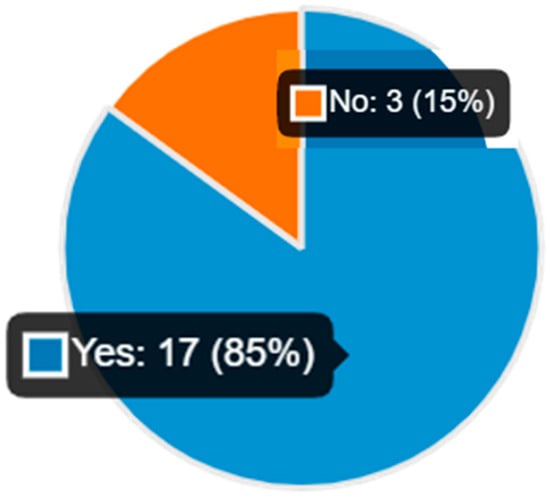
Figure 1
Open AccessArticle
Assessing the Potential and Risks of AI-Based Tools in Higher Education: Results from an eSurvey and SWOT Analysis
by
Kerstin Denecke, Robin Glauser and Daniel Reichenpfader
Trends High. Educ. 2023, 2(4), 667-688; https://doi.org/10.3390/higheredu2040039 - 06 Dec 2023
Abstract
Recent developments related to tools based on artificial intelligence (AI) have raised interests in many areas, including higher education. While machine translation tools have been available and in use for many years in teaching and learning, generative AI models have sparked concerns within
[...] Read more.
Recent developments related to tools based on artificial intelligence (AI) have raised interests in many areas, including higher education. While machine translation tools have been available and in use for many years in teaching and learning, generative AI models have sparked concerns within the academic community. The objective of this paper is to identify the strengths, weaknesses, opportunities and threats (SWOT) of using AI-based tools (ABTs) in higher education contexts. We employed a mixed methods approach to achieve our objectives; we conducted a survey and used the results to perform a SWOT analysis. For the survey, we asked lecturers and students to answer 27 questions (Likert scale, free text, etc.) on their experiences and viewpoints related to AI-based tools in higher education. A total of 305 people from different countries and with different backgrounds answered the questionnaire. The results show that a moderate to high future impact of ABTs on teaching, learning and exams is expected by the participants. ABT strengths are seen as the personalization of the learning experience or increased efficiency via automation of repetitive tasks. Several use cases are envisioned but are still not yet used in daily practice. Challenges include skills teaching, data protection and bias. We conclude that research is needed to study the unintended consequences of ABT usage in higher education in particular for developing countermeasures and to demonstrate the benefits of ABT usage in higher education. Furthermore, we suggest defining a competence model specifying the required skills that ensure the responsible and efficient use of ABTs by students and lecturers.
Full article
(This article belongs to the Special Issue EdTech in Higher Education: Future Perspective on Teaching and Learning)
►▼
Show Figures
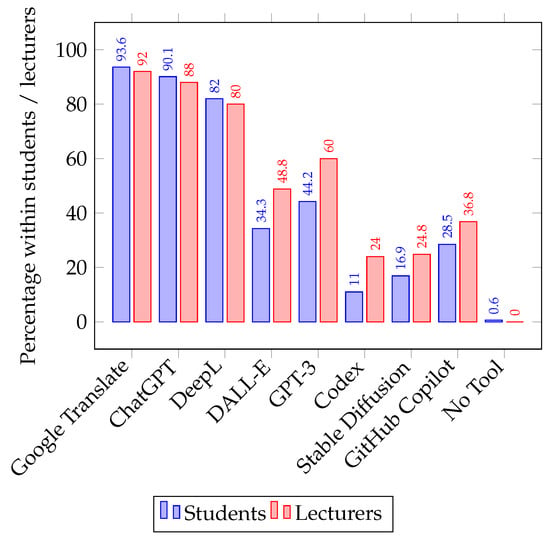
Figure 1
Highly Accessed Articles
Latest Books
E-Mail Alert
News
Topics
Topic in
Education Sciences, EJIHPE, Sustainability, Trends in Higher Education
Education for Sustainable Development and Science Teaching
Topic Editors: José Benito Vázquez Dorrío, Araceli Queiruga-Dios, Manuel Filipe P. C. M. Costa, Miguel Ángel Queiruga DiosDeadline: 31 December 2024
Topic in
Education Sciences, Healthcare, Merits, Sustainability, Trends in Higher Education
Establishing Professional Competency and Talent Cultivation Strategies in the Post-Pandemic Generation Based on the Sustainability Education Development
Topic Editors: Chia-Li Lin, Chi-Yo Huang, Chihhung ChenDeadline: 1 March 2025

Conferences
Special Issues
Special Issue in
Trends in Higher Education
Higher Education Systems
Guest Editor: Colin McCaigDeadline: 7 May 2024
Special Issue in
Trends in Higher Education
STEM in Higher Education
Guest Editors: Carla Johnson, Janet B. WaltonDeadline: 31 August 2024
Special Issue in
Trends in Higher Education
Interdisciplinary and Multi-Scalar Design and Research Models in Architectural Practice and Education
Guest Editors: Asma Mehan, Sina MostafaviDeadline: 1 October 2024
Special Issue in
Trends in Higher Education
Faculty at Midcareer
Guest Editors: Heather Kanuka, Jonathan AnuikDeadline: 20 October 2024



